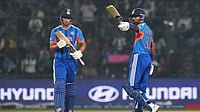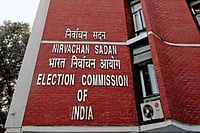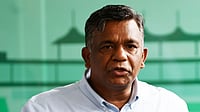A Pakistani court here on Monday rejected former prime minister Imran Khan’s plea seeking the suspension of the non-bailable warrant issued against him in the Toshakhana case.
Additional Session judge Zafar Iqbal, who had earlier in the day reserved the verdict, announced it later in the day after a brief hearing of the case. During today’s hearing, Khan’s lawyers Ali Bukhari, Qaiser Imam, and Gohar Ali Khan appeared before the Islamabad district and sessions court, where Bukhari contended that his client had always followed court orders.
Imam argued that police could not arrest the Pakistan Tehreek-e-Insaf (PTI) chief if he was willing to appear in court. At this, the judge remarked that the PTI chief could have approached the Islamabad High Court to suspend the warrant to which Imam said they wanted the sessions court to suspend it. Bukhari added that 70-year-old Khan was at his Zaman Park residence in Lahore and wanted to know a "way he can appear in court”.
Urging the court to suspend the warrant, Imam argued that a private complaint was registered against the PTI chief under the Election Act 2017 and that arrest warrants were usually not issued on a private complaint. The judge had earlier in the day remarked that the PTI chief’s lawyer had informed them that their client would not appear in the court and reserved the verdict for later.
On February 28, Additional Sessions Judge Zafar Iqbal issued a non-bailable arrest warrant against the cricketer-turned-politician for continuously failing to appear before the court in the Toshakhana case. Khan has been in the crosshairs for buying gifts, including an expensive Graff wristwatch he had received as the premier at a discounted price from the state depository called Toshakhana, and selling them for profit.
In his assets declarations, he is accused of concealing details of the gifts he retained from the Toshakhana - a repository where presents handed to government officials from foreign officials are kept. Officials are legally allowed to retain gifts provided they pay a pre-assessed amount, typically a fraction of the value of the gift.
The PTI chief approached the Lahore High Court (LHC) on Sunday for post-arrest bail after an Islamabad police team arrived at his Zaman Park residence to arrest him for skipping proceedings in the Toshakhana case. However, the police team returned empty-handed after Khan evaded the arrest. The Dawn newspaper in a report said the LHC registrar had raised objections to Khan's plea, saying that complete documents had not been submitted along with the petitions.
Khan has not attended any hearings since November last year when he was injured in an assassination attempt at his rally in the Wazirabad area of Punjab. Khan was granted interim bail by a special court in Islamabad after being shot during the assassination attempt. He has since received extensions on his bail due to medical reasons.
Khan was ousted from power in April after losing a no-confidence vote in his leadership, which he alleged was part of a US-led conspiracy targeting him because of his independent foreign policy decisions on Russia, China, and Afghanistan. The PTI chief, who came to power in 2018, is the only Pakistani Prime Minister to be ousted in a no-confidence vote in Parliament.


























